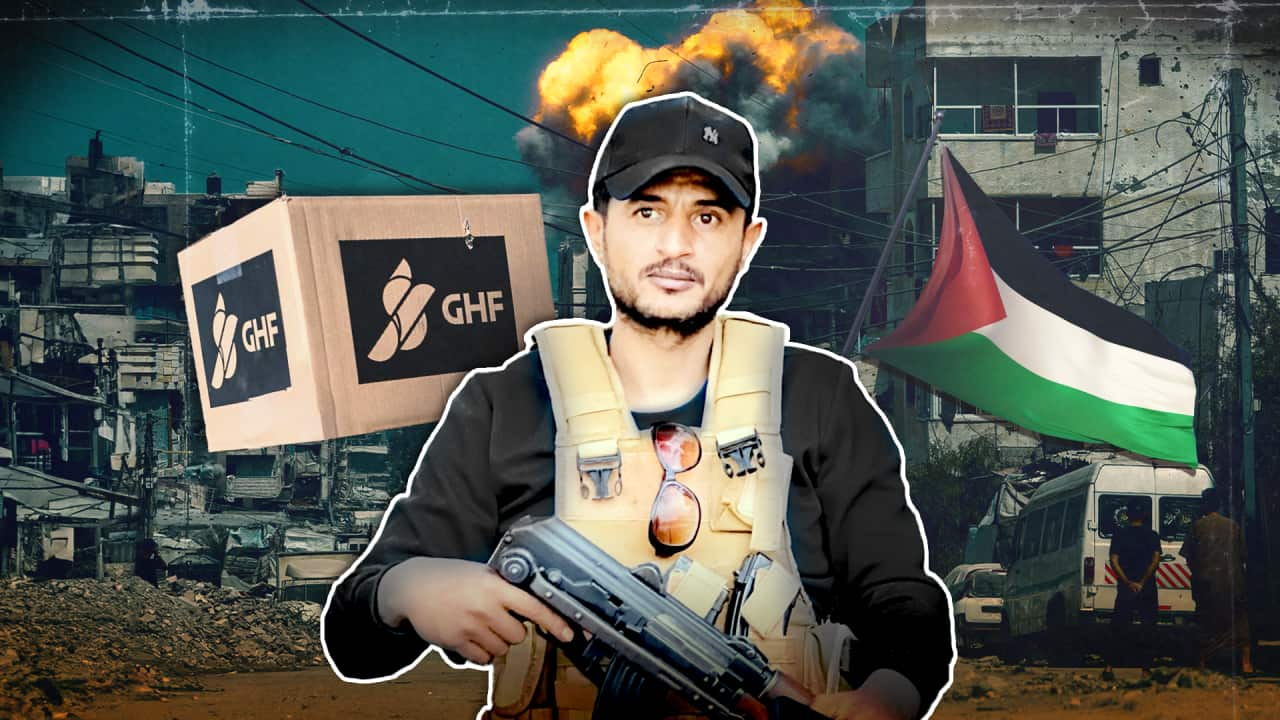The first near-impossible challenge faced by Palestinians in Gaza is obtaining food. The second is bringing it home without getting robbed, assaulted or shot.
To pull this off, aid-seekers have for months had to endure hours-long waits at aid sites, dodging and surviving unpredictable shootings from Israeli soldiers.
Now, they're also wary of a new threat — armed gangs.
Since 27 May, more than 2,500 Palestinians have been killed while seeking aid, according to the UN's Office for the Coordination of Human Affairs (OCHA).
Shadi al-Kurd is a father of five living in Gaza's Jabalya refugee camp, desperately trying to feed his extended family, who have been surviving most days on a single meal.
He told a field researcher for Israeli human rights organisation B'Tselem in June that when he leaves each day at 4.30am to walk four kilometres to the nearest aid distribution site, he farewells his family as though it's the last time he'll see them.
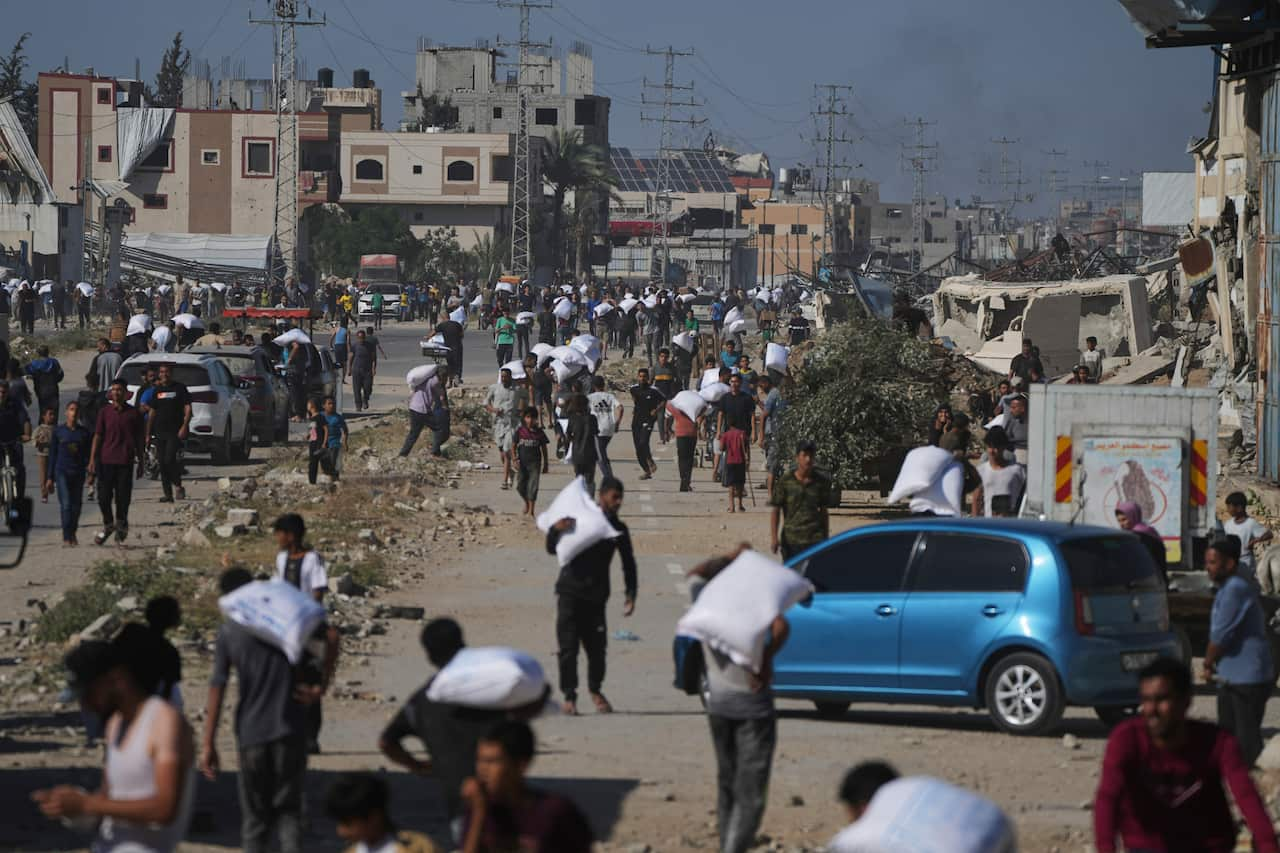
Al-Kurd described to B'Tselem witnessing scenes of anarchy at aid distribution sites.
"There are armed gangs that arrive in vehicles. They get to the trucks before anyone else, start shooting in the air, scare people and seize large quantities of flour sacks," he said.
"It's total chaos, people fighting everyone trying to protect their package so it won't get stolen."
The sacks of flour often weigh around 25kg.
"When I get tired, I sit somewhere to rest for about 10 minutes, all the while holding a knife in my hand, afraid one of the thugs will try to steal the flour from me. That's happened to many people on their way back from the aid distribution centres."
Al-Kurd said he sometimes takes his son Ahmad "so he can protect me", or travels with a friend.
Israel in June acknowledged harming civilians at aid sites, noting that incidents are "under review". Hundreds more Gazans have been fatally shot since then.
In a statement, a spokesperson for the Israel Defense Forces (IDF) noted that it is aiming to improve the "operational response" in aid distribution zones and minimise "possible friction between the population and the IDF Forces as much as possible".
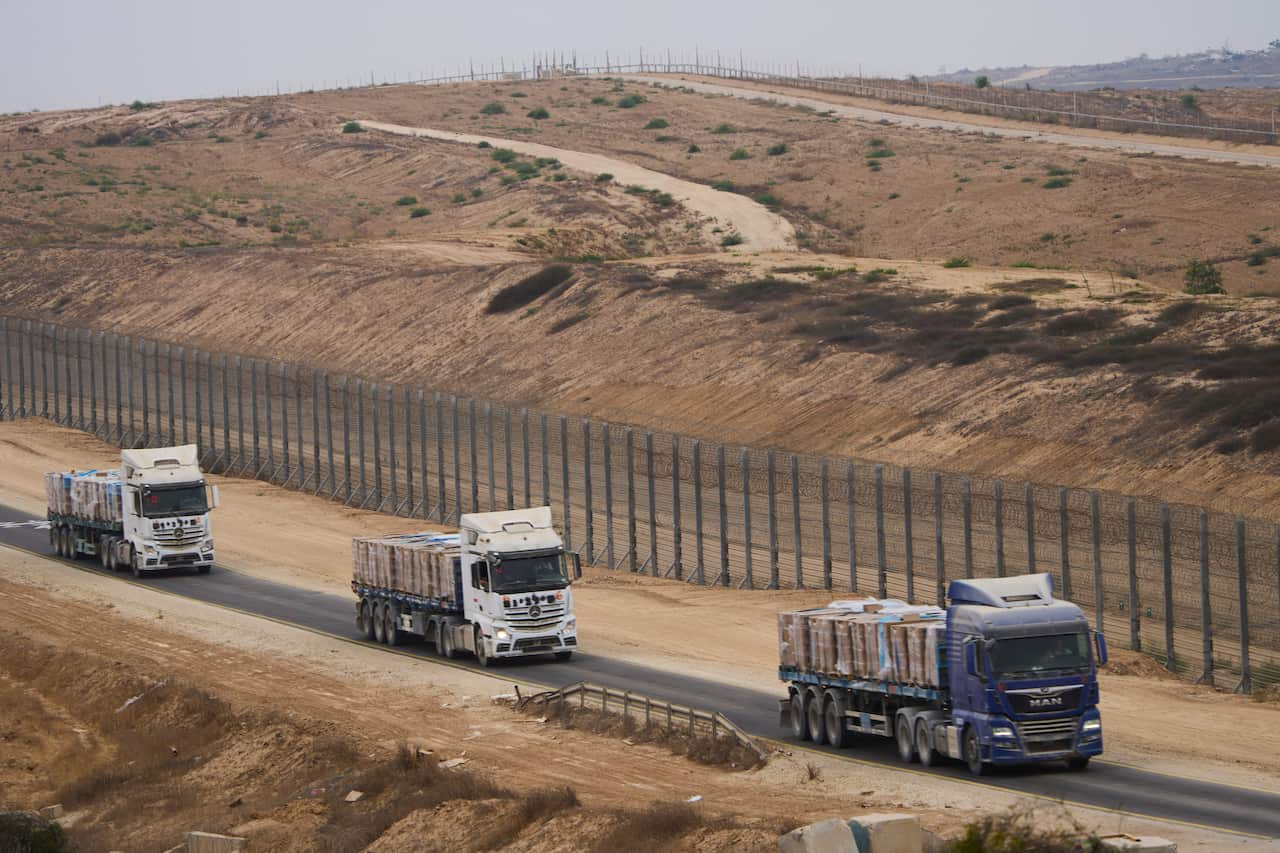
"As part of this effort, IDF forces have recently worked to reorganise the area through the installation of fences, signage placement, the opening of additional routes, and other measures," the spokesperson said.
Israel cut off all supplies to the territory in March, claiming that Hamas was looting UN aid. Sites were later reopened in May.
But data shows Hamas, which rejects allegations of looting, is not responsible for the majority of aid looted — civilians, gangs and family clans are.
The newly released data compiled by international conflict monitor ACLED shows a major spike in intra-Palestinian violent incidents this year, as well as a significant rise in stolen aid packages.
It comes as Gaza marks two years under devastating Israeli bombardment, and since Hamas' October 7 2023 attack in which more than 1,200 Israelis were killed and over 200 hostages taken, according to the Israeli government.
More than 66,000 people have been killed in Gaza since October 7, according to the health ministry in Gaza.
Israel denies it is fuelling the widespread hunger in Gaza, which a UN-backed group says meets famine conditions in some parts, describing it as "a Hamas-orchestrated starvation campaign". Prime Minister Benjamin Netanyahu has said: "There is no policy of starvation in Gaza, and there is no starvation in Gaza."
But ACLED's data shows armed militant gangs have emerged as a new threat since at least mid-2024, stealing aid and engaging in violent clashes.
Some analysts believe the gangs are Israeli-backed and have described them as part of a strategy to make life in Gaza even more unbearable and push people to move to Israeli-controlled sections in the enclave's south.
What do we know about gangs operating in Gaza?
Former Israeli defence minister Avigdor Liberman said in June that Israel had been giving weapons to felons and criminals to fight against Hamas and linked the most prominent gang, the Abu Shabab group, to the self-proclaimed Islamic State group.
The group, believed to have over 100 fighters, is led by former convict Yasser Abu Shabab, who has denied receiving Israeli support or having contact with the Israeli army.
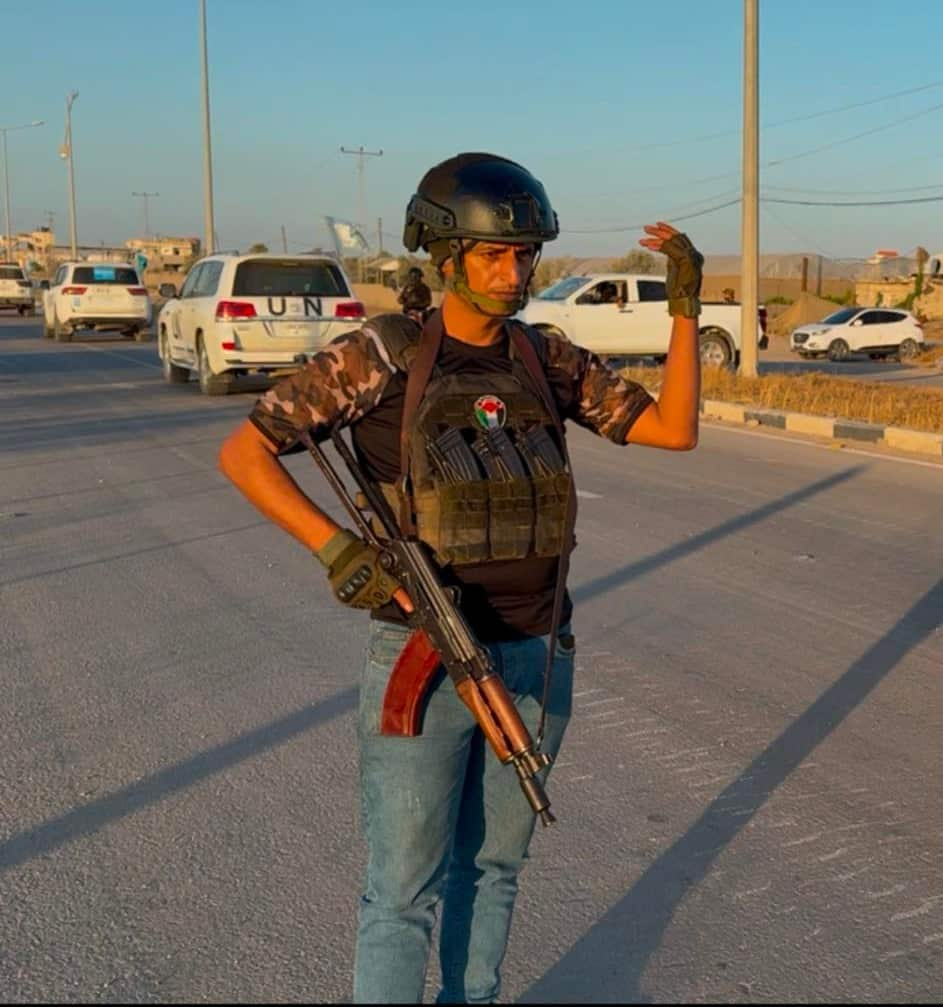
Responding to Liberman in a social media video on 6 June, Netanyahu said: "On the advice of security officials, we activated clans in Gaza that oppose Hamas. What's wrong with that?"
"It only saves the lives of Israeli soldiers."
The "activated clans" Netanyahu refers to are a network of political families in Gaza, but further allegations have been made that Israel is supporting a separate set of armed gangs.
Jonathan Whittall, the head of OCHA's operations in the Occupied Palestinian Territories, has previously said theft of aid since October 7 has been carried out by criminal gangs, under the watch of Israeli forces, confirming to the Guardian he was referring to Abu Shabab.
Recently, new forces have reportedly emerged further north in Khan Younis.
"Israel created a new proxy gang run by a fugitive murderer, drug dealer, fraudster and longtime collaborator Husam Abdel-Majid Al-Astal," Muhammed Shehada wrote on X.
Shehada, a Gazan political analyst and visiting fellow at the European Council of Foreign Relations, said the new group is connected to Abu Shabab.
SBS News sought comment from the IDF, but it did not respond to specific questions about its alleged arming of rival gangs.
Data shows rise in gang violence
ACLED has recorded over 220 intra-Palestinian violent incidents that have resulted in the deaths of around 400 Palestinians since 7 October 2023 — nearly 70 per cent of these occurred after the temporary ceasefire ended in March 2025.
Around 67 of these were clashes between armed gangs and Hamas.
Khdour says these groups are much more concerning than clans and other smaller criminal groups who clash with Hamas.
Hamas has been losing control over Gazans since October 7 and more markedly so since the brief ceasefire with Israel ended in March, he says.
"Hamas sees it is fighting a war on two fronts," Khdour says.
"The first front is against the IDF troops who have the objective to seize as much territory as possible in the Gaza Strip and prevent Hamas from establishing itself in these areas, and the other is to maintain the stability in Gaza Strip.
"So far, these anti-Hamas groups are operating in areas where the IDF has established control. But their influence is still not much compared to Hamas, which is by far the strongest military power."
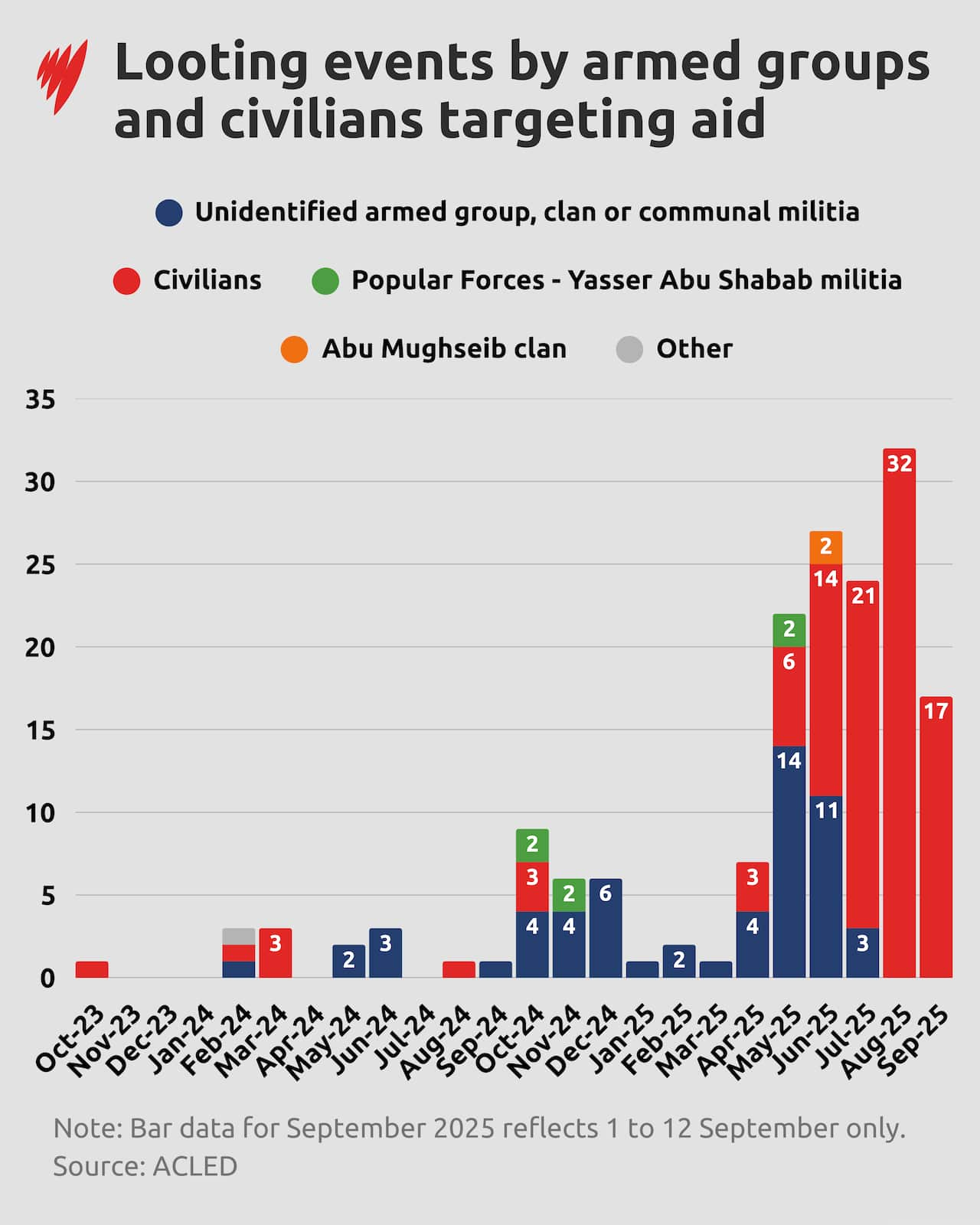
He says he expects unrest to rise in areas where Hamas' political and military influence has been weakened.
"Israel has weakened the civil government of Hamas by targeting the police, the civil governments — especially police — and those involved in domestic security, which allows also for these gangs and groups to grow."
Hamas has run the Gaza Strip since 2007, after a brief civil war with forces loyal to the Fatah movement led by President Mahmoud Abbas, who is based in the West Bank and also heads the Palestine Liberation Organization (PLO).
The Hamas takeover of Gaza followed its win in Palestinian parliamentary elections in 2006 — the last time they were held. Hamas has accused Abbas of conspiring against it, while Abbas describes what happened as a coup.
Hamas refuses to recognise the state of Israel and violently opposed the Oslo peace accords negotiated by Israel and the PLO in the mid-1990s.
Hamas, in its entirety, is designated as a terrorist organisation by countries including Australia, Israel, Canada, the UK and the US. (Some countries list only its military wing as a terrorist group.)
The UN has not condemned Hamas in its entirety as a terrorist organisation, due to insufficient support from member states to do so during a 2018 vote.
Why might Israel be arming gangs in Gaza?
Israel says its objectives are to negotiate the release of all hostages still held by Hamas and defeat and eventually disarm Hamas.
But Tariq Kenney-Shawa, a US policy fellow at the Al-Shabaka think-tank, tells SBS News Israel wants to gain "maximum land with minimum Palestinians".
He says part of that strategy involves working with gangs to degrade civil society within Gaza.
"Israel can essentially subcontract the nitty-gritty, often costly job of occupation and on-the-ground control of population control to these friendly, controllable Palestinian militias and gangs," he says.
"But the second kind of prong in that strategy is it fits within Israel's broader objective of rendering the entire Gaza strip uninhabitable in order to make Palestinians feel that they have no choice but to leave Gaza if given the opportunity."
The IDF did not respond to questions about its motivations to allegedly arm rival gangs in Gaza.
A spokesperson told SBS News that IDF forces "conduct systematic learning process" aimed at removing friction between Gaza’s population and IDF forces.
"Following incidents in which harm to civilians who arrived at distribution facilities was reported, thorough examinations were conducted in the Southern Command and instructions were issued to forces in the field following lessons learned," the spokesperson said.
Last month, an independent UN Commission of Inquiry found Israel was committing genocide in Gaza, a finding Israel has rejected, saying the commission's report was "distorted and false".
Also in September, the world's biggest academic association of genocide scholars passed a resolution saying the legal criteria have been met to establish that Israel is committing genocide in Gaza.
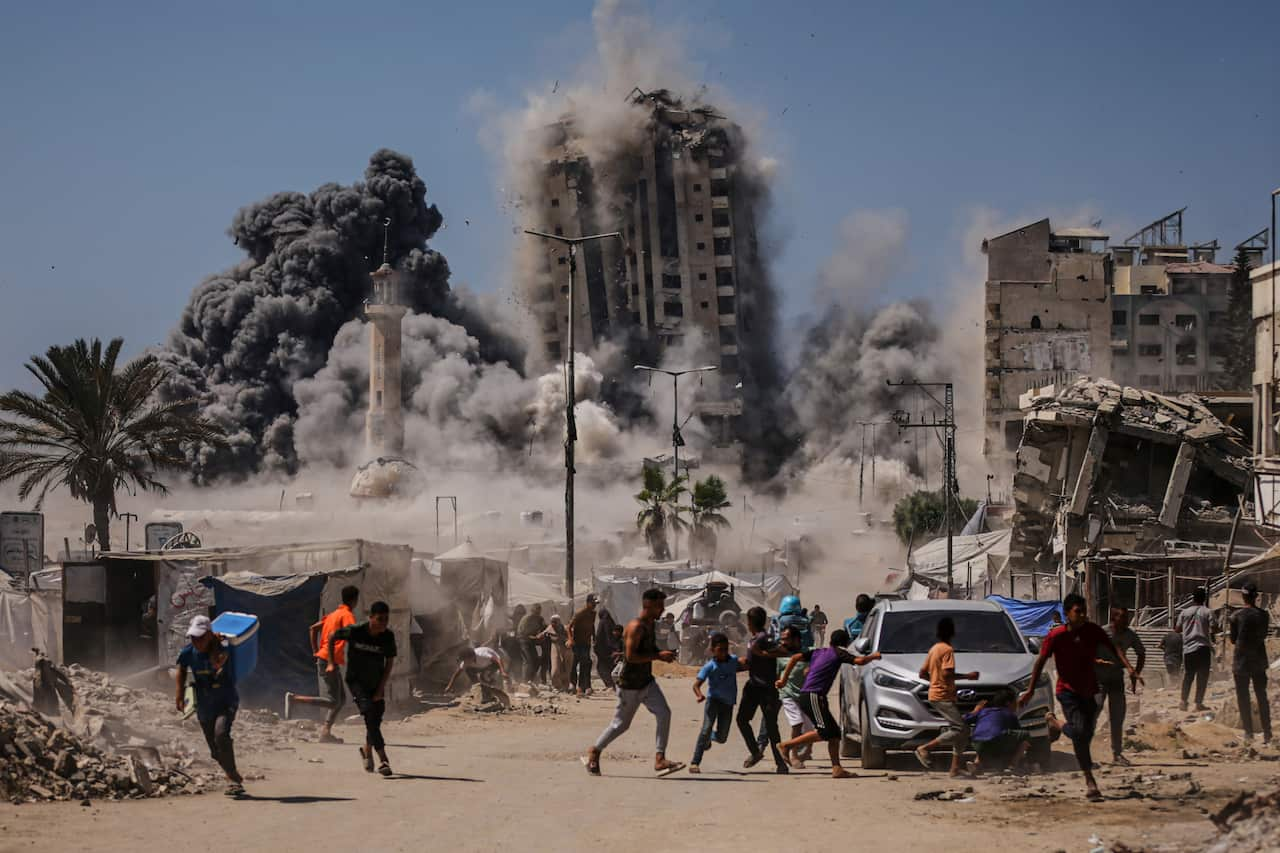
Israel's foreign ministry called the statement disgraceful and "entirely based on Hamas' campaign of lies".
Israel has in the past strongly denied that its actions in Gaza amount to genocide and says they are justified as self-defence.
It is fighting a case at the International Court of Justice in The Hague that accuses it of genocide — allegations Israel flatly rejects, insisting it is attempting to obliterate Hamas, which is operating among Palestinian civilians.
Kenney-Shawa says that when he speaks to people in Gaza, the "breakdown of order is very much top of mind".
"Where Palestinians see and feel deliberately-seeded chaos and lawlessness most is aid."
He says Israel is not only empowering gangs, but "intensifying that sense of everything being chaos".
An impossible choice between Hamas and something 'worse'
Hamas regularly uses violence to enforce its rule over Gazans, and in recent months, violent incidents have increased, according to ACLED data.
Hamas has established a unit of plainclothes police officers — named the Sahm unit — to patrol aid distribution sites, punish people who steal aid and detain people suspected of collaborating against Hamas or with Israel.
The group has been filmed breaking alleged thieves' legs, while last month Hamas-led authorities in Gaza executed three men accused of collaborating with Israel, a Palestinian official told Reuters.
Kenney-Shawa says people in Gaza have very divided and complicated opinions on Hamas.
"By and large, people don't support those executions and are horrified by those types of public punishments, but they see the alternative, which are these roaming armed gangs that in many cases can be worse than Hamas."
He says some people within Gaza would prefer "the relative calm and order" they experienced under Hamas before October 7 to "what is a far darker and more violent future under these gangs and militias".
— With additional reporting from Reuters.
For the latest from SBS News, download our app and subscribe to our newsletter.
